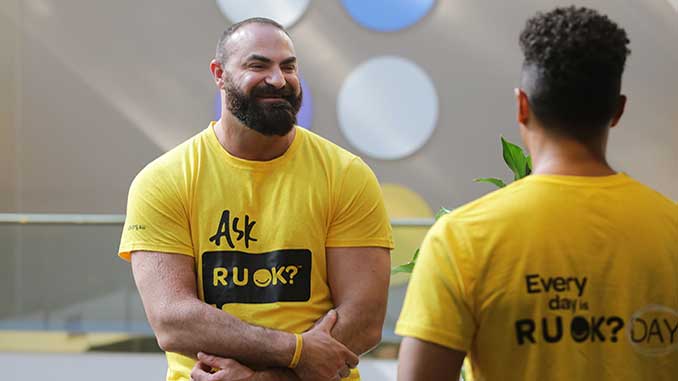 R U OK? are calling on the LGBTIQ+ communities and their allies to let the people they care about know: I’m here to hear, every day of the year, as part of R U OK? Day on Thursday 14 September 2023.
R U OK? are calling on the LGBTIQ+ communities and their allies to let the people they care about know: I’m here to hear, every day of the year, as part of R U OK? Day on Thursday 14 September 2023.
R U OK? have dedicated resources to help you know when and how to ask someone who is gender, bodily or sexuality diverse, ‘are you OK?’, in a safe and supportive way. The free R U OK? LGBTIQ+ conversation guide was developed in consultation with LGBTIQ+ Health Australia and is available at: www.ruok.org.au
R U OK? Community Ambassador Nathan Urquhart, 40, identifies as a member of the LGBTIQ+ community and lives with anxiety and depression.
“It’s important that people ask, ‘are you OK?’ because it can change people’s lives. I lived through an experience where I wasn’t asked, I wasn’t connecting, and I was quite disconnected from the world. I felt very alone,” said Mr Urquhart – who believes a conversation can make a real difference in someone’s life.
“Having exposure to R U OK?, and understanding the power of a conversation has allowed me to really reflect on the difference it makes, or it could have made, when I was in a really low place.”
“I had the opportunity to ask someone how they were and if they were OK. That conversation had a huge impact when they were disconnected from a lot of people because of the situation of them having lost someone to suicide,” said Mr Urquhart.
Mr Urquhart said you shouldn’t only ask, ‘are you OK?’ when someone is visibly struggling but should check in regularly and stay connected throughout the year. “If I’m having a really hard day, I tend to shut down and feel very alone,” Mr Urquhart explained.
“When someone takes the time to connect with me, it allows me to recentre and get out of my head, which sometimes is not a very friendly place. It allows me to find that balance with reality.”
Mr Urquhart‘s experience reinforces how showing genuine interest and concern when you ask someone, ‘are you OK?’ can encourage a meaningful conversation.
“You need to ask this question because you mean it. If you really care and want to hear an honest answer, be genuine with your ask, make space to listen and let the person know you’re sticking around for whatever comes next,” said Katherine Newton, R U OK? CEO.
“We know the positive impact an R U OK? conversation have when people know and trust each other. This usually means that trust has been built over time, they’re familiar with each other’s routines and behaviours, and they likely know what’s going on in each other’s lives.”
“This trust, along with consideration of the where and when a conversation will take place contributes to making an R U OK? conversation truly meaningful,” said Ms Newton.
Let the people in your world know you’re here, to really hear, because a conversation could change a life. You can find FREE resources at www.ruok.org.au to help you know when and how to ask, ‘are you OK?’ in your workplace, school and community, every day of the year.
Image: Community Ambassador Nathan Urquhart (supplied)
If you are someone you know needs support, please reach out to one of the following orgsanisations:
QLife offers phone and online anonymous and free LGBTI support and referral for people in Australia. Call 1800 184 527 or visit: www.qlife.org.au from 3.00pm – midnight local time every day.
For support at any time of day or night, Lifeline provides free and confidential crisis support. Call 13 11 14, text 0477 13 11 14 or chat online at: www.lifeline.org.au
13YARN is a free 24/7 service offering crisis support for Aboriginal & Torres Strait Islander people. Call 13YARN (13 92 76).
